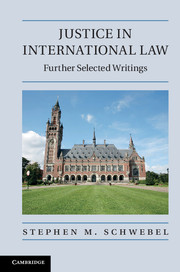Book contents
- Frontmatter
- Contents
- PART I International Court of Justice
- 1 Reflections on international adjudication
- 2 The impact of the International Court of Justice
- 3 The politics of adjudication
- 4 National judges and judges ad hoc of the International Court of Justice
- 5 The roles of the Security Council and the International Court of Justice in the application of international humanitarian law
- 6 The inter-active influence of the International Court of Justice and the International Law Commission
- 7 A site visit of the World Court
- 8 The proliferation of international tribunals: threat or promise?
- 9 The Gulf of Maine maritime boundary delimitation: the constitution of the chamber
- 10 The judgment of the International Court of Justice in the case concerning the Gabčíkovo-Nagymaros Project (Hungary/Slovakia)
- 11 Gorbachev embraces compulsory jurisdiction
- PART II International arbitration
- PART III Miscellaneous
- Collected publications, judicial opinions and book reviews
- Index
3 - The politics of adjudication
from PART I - International Court of Justice
Published online by Cambridge University Press: 07 September 2011
- Frontmatter
- Contents
- PART I International Court of Justice
- 1 Reflections on international adjudication
- 2 The impact of the International Court of Justice
- 3 The politics of adjudication
- 4 National judges and judges ad hoc of the International Court of Justice
- 5 The roles of the Security Council and the International Court of Justice in the application of international humanitarian law
- 6 The inter-active influence of the International Court of Justice and the International Law Commission
- 7 A site visit of the World Court
- 8 The proliferation of international tribunals: threat or promise?
- 9 The Gulf of Maine maritime boundary delimitation: the constitution of the chamber
- 10 The judgment of the International Court of Justice in the case concerning the Gabčíkovo-Nagymaros Project (Hungary/Slovakia)
- 11 Gorbachev embraces compulsory jurisdiction
- PART II International arbitration
- PART III Miscellaneous
- Collected publications, judicial opinions and book reviews
- Index
Summary
The judicial process should, ideally, be unaffected by political considerations. The judge should decide solely on the basis of the facts of the case and the governing law. A judge of integrity and ability will make every effort to decide the dispute solely in response to the facts and the law. Nevertheless in practice this estimable ideal is not easily realized.
Every judge is a prisoner of his or her own experience. Every judge, just as every man, sees with his own eyes. The judge sees the facts and applies the law to those facts with his own limited vision, a vision inevitably affected by his genetic endowment and environmental influences, his nationality, education, experience, not to speak of more evanescent factors such as his relations with his colleagues. Perfect objectivity is unattainable. Yet a sufficient objectivity is achievable as the workings of many courts have shown. If that were not so, presumably courts would not endure.
The institution of adjudication is entrenched in civilization. Yet in many if not most countries, it may not work well. Jan Paulsson, a leading international arbitrator and advocate, recently published a sobering, even searing, essay on “Enclaves of Justice” showing how dilatory or corrupt are courts in much of the world much of the time. Extra-legal factors, including what may loosely be called political factors, too often debase the judicial process.
- Type
- Chapter
- Information
- Justice in International LawFurther Selected Writings, pp. 21 - 24Publisher: Cambridge University PressPrint publication year: 2011



